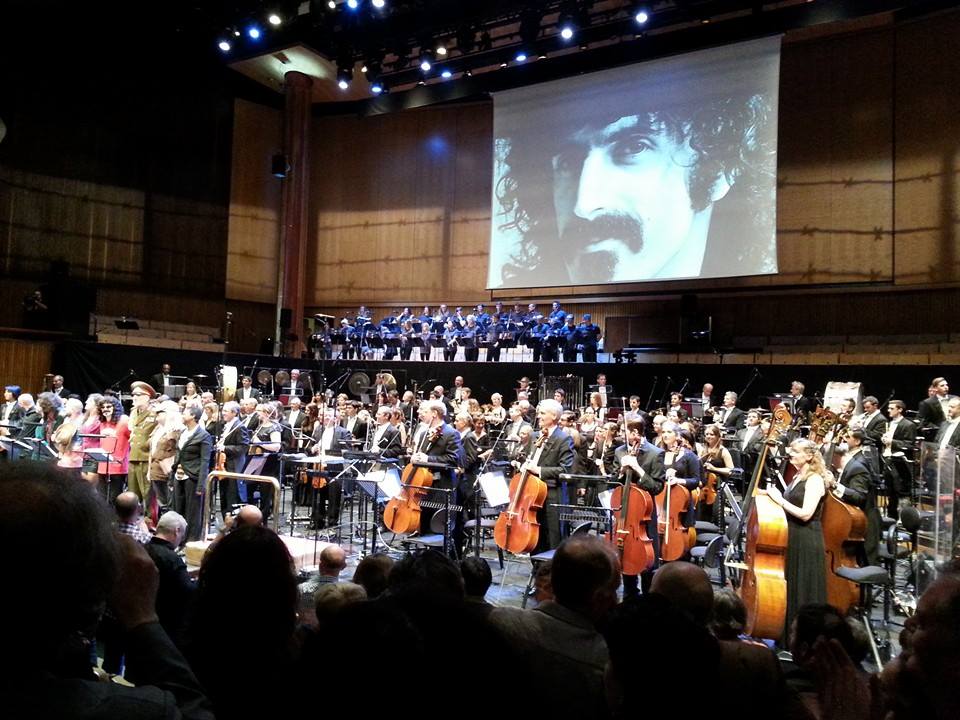Last week saw the (delayed) première of Frank Zappa’s 200 Motels; Drama graduate and former member of Chamber Choir, Steve Graney, was in the audience…
BBC Concert Orchestra, Southbank Sinfonia, London Voices Conductor: Jurjen Hempel, Soprano: Claron McFadden Royal Festival Hall, Tuesday 29th October, 2013

“Touring can make you crazy, Ladies and Gentlemen.”
In the case of Frank Zappa, touring can make you so crazy that you write a musical film in which you are played by Ringo Starr, Ringo’s chauffeur plays your ex-bassist and your former-saxophonist plays a Newt Rancher who falls in love with an Industrial Vacuum Cleaner.
Welcome to 200 Motels, a ‘surrealistic documentary’ of life on the road for Zappa and his band The Mothers of Invention; a musical satire of the tensions, groupies, chemical experimentations and absurdities that come with a rock & roll tour.
The orchestral concert version, forty-two years after its performance at the Royal Albert Hall was cancelled on grounds of obscenity, was finally unveiled to the UK in the Southbank’s ‘The Rest is Noise’ festival of twentieth-century music. It was a joyous spectacle (witnessing the London Voices wave light-up, rubber – how can I put this? – ‘recreational aids’ during a suite entitled ‘Penis Dimension’ is surely a once-in-a-lifetime experience). It also cemented Zappa’s status as a key twentieth-century composer.
Zappa’s versatility spans achingly beautiful string lines, challenging free jazz-reminiscent choral arrangements and even a majestic Bolero. The influence of Frank’s idols Stravinsky and Varèse is evident in the piece’s suspenseful harmonic dissonance and polyrhythmic, percussive atonality, but this in no way detracts from his individuality and unique approach to composition; I for one would pay good money just to glimpse a score that orders the horn players to jump on the spot.
The onstage rock band played second fiddle to the orchestra on this ‘Strictly Genteel’ classical occasion, although guitarist Leo Abrahams did treat us to a few tasty electric licks and there were some impressive Don Preston-style synth-keyboard skills to be heard.
Vocals and dialogue from the film also featured. These were stronger in some areas than others. Ian Shaw and Brendan Reilly, while vocally solid, didn’t recapture the raucous showmanship of Mothers frontmen and former-Turtles Mark Volman and Howard Kaylan. However, Tony Guilfoyle, in FZ wig and moustache, brought Zappa’s surreal, self-parodying sense of humour to the fore magnificently. His accompaniment of the ‘I Have Seen the Pleated Gazelle’ segment (concerning the Girl-Newt Rancher-Industrial Vacuum Cleaner love triangle) with its composer’s justification that this was “a love story people could relate to” was dry, bizarre and hilarious.
I have nothing but admiration for soprano Claron McFadden’s breath-taking melodic and lyrical clarity. Any trained soprano who can sing, unfazed, lines like “If there’s one thing I really get off on it’s a nun suit painted on some old boxes” has my undying respect.
As the packed Royal Festival Hall leapt into standing ovation, we half-hoped our cries of “More!” might prompt an encore of ‘Peaches En Regalia’ or similar. But we were content with Jurjen Hempel lifting the mammoth conductor’s score triumphantly aloft, finally performed in full.
Would Frank’s words have been words of pride? “About f***ing time” might be nearer the mark.
Who knows. He was Only In It For The Money anyway.
Steve Graney


 I’ve
I’ve